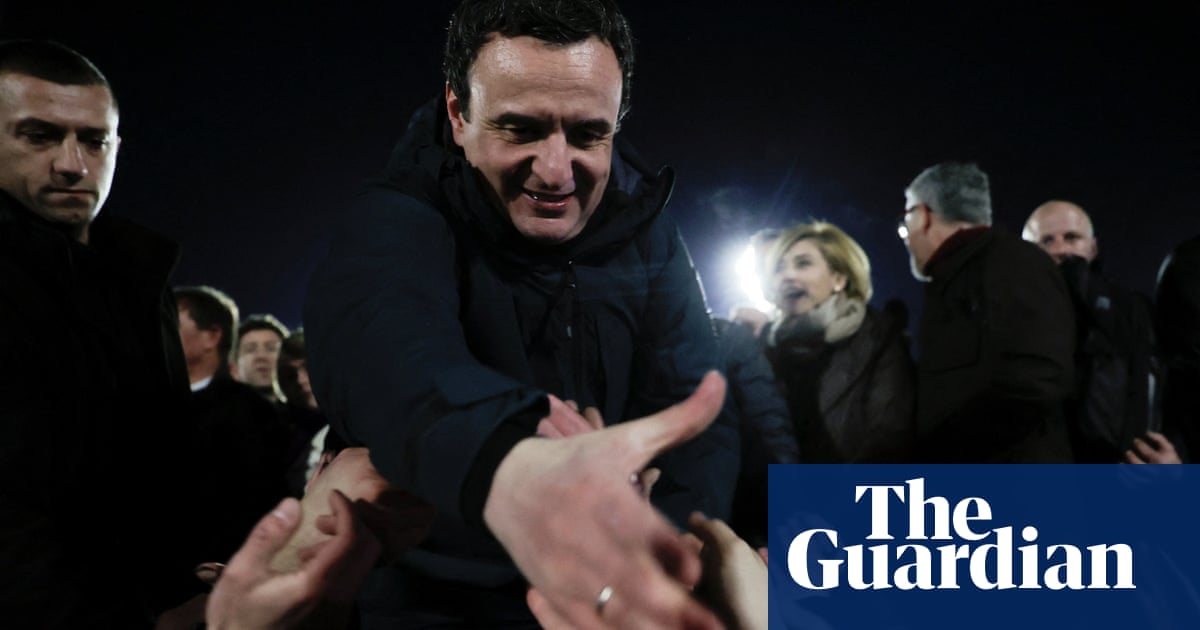Kosovo’s ruling Vetevendosje party was on track to win the country’s parliamentary election, but will need to negotiate a coalition with other parties to form a government, exit polls and preliminary results showed.
With 73% of the votes counted, prime minister Albin Kurti’s leftist Self-Determination Movement Party, or Vetevendosje, had won 41.99%.
The election result would be a drop from the more than 50% that it won in 2021. But it puts Kurti in position to lead the next government in a country whose politics are dominated by the relationship with neighbouring Serbia and Serbs within its borders.
During the election campaign Kurti apparently ruled out forming a coalition, saying he would not participate in government unless he won an outright majority.
But, late on Sunday after proclaiming victory, Kurti said he would form the new government without hinting who could be a potential coalition partner.
“We are the first party, the winning party that will create the next government,” Kurti told reporters. “We will continue to finish the work that we have started.”
Kurti’s party called supporters to go out in the streets to celebrate.
Kosovo’s election commission said it was not able to publish the full results on Sunday because its software was down and they will collect data manually and publish early hours on Monday.
“We apologise to all Kosovo citizens,” head of election commission Kreshnik Radoniqi said.
The opposition Democratic League of Kosovo (LDK) conceded Vetevendosje victory. Its leader Lumir Abdixhiku said that according to LDK’s own vote count Vetevendosje had come first with 39.08% of the votes, the opposition Democratic party of Kosovo came second with 21.84% of the votes while his party came third with 18.14% of the votes.
Three exit polls gave Kurti between 37% and 40.04% of the votes.
Kurti, an Albanian nationalist, came to power in 2021 when a coalition run by the Vetevendosje party received more than 50% of votes and secured a seven-seat majority in the 120-seat parliament.
Kosovo, Europe’s newest country, gained independence from Serbia in 2008 with backing from the United States after a 78-day Nato bombing campaign against Serbian forces in 1999.
Political analysts say Kurti’s popularity has been bolstered by moves to extend government control in Kosovo’s ethnic Serb-majority north. But critics say he has failed to deliver on education and health services, and that his policies have distanced Kosovo from its traditional allies, the European Union and the United States.
The EU placed economic curbs on the country in 2023 for its role in stoking tensions with ethnic Serbs, cutting at least 150m euros ($155m) in funding, Reuters has found.
The centre-right LDK campaigned on restoring relations with the United States and the EU, and joining Nato.
Kurti’s government has had some wins. Unemployment has shrunk from 30% to about 10%, the minimum wage is up and last year the economy grew faster than the western Balkans average.
The election campaign has been acrimonious. The Elections Complaints and Appeals Panel, which monitors party and candidates’ complaints, has issued more than 650,000 euros in fines to parties this election season, three times the 2021 tally, data from NGO Democracy in Action shows.
Reuters and Associated Press contributed to this report
Article by:Source: Guardian staff and agencies













:max_bytes(150000):strip_icc():focal(718x391:720x393)/louise-lasalle-tout-2825-c7e93a6a127e4a949029f49418004115.jpg?w=300&resize=300,180)
:max_bytes(150000):strip_icc():focal(718x391:720x393)/louise-lasalle-tout-2825-c7e93a6a127e4a949029f49418004115.jpg?w=80&resize=80,80)